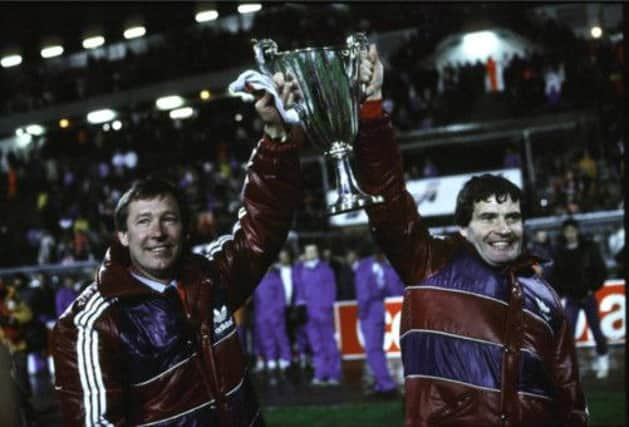Sir Alex Ferguson: Aberdeen can end trophy drought


That is why he says he must defend the trophy against the accusation that it has been robbed of its relevance. Aberdeen, for one, would clearly love to test the claim that winning the competition doesn’t mean as much as it once did. Since the last of Ferguson’s four Scottish Cup victories in 1986, Aberdeen have only needed to make room for the cup in the trophy room on one further occasion – in 1990.
On the evidence of Monday night’s performance against Partick Thistle, which he watched on television, Ferguson believes there is no reason why his former club cannot lift the trophy this season, with their campaign starting in three weekends’ time against the same Glasgow opponents.
Advertisement
Hide AdAdvertisement
Hide AdFerguson had hoped to give Aberdeen a home tie on his return to the city, where he made yesterday’s draw. He gave them perhaps the next best thing – a tie against a team they have already scored seven times against this season without reply.
The draw for the fourth round was scheduled to fit in with Ferguson’s book tour theatre shows, the latest of which was held at Aberdeen music hall last night. But Ferguson’s appearance back in town has also coincided with the latest surge in optimism at Pittodrie.
Aberdeen’s fourth victory in a row on Monday took Derek McInnes’ side back to second place in the Premiership, four points behind leaders Celtic. It isn’t quite like the old days but Ferguson has enjoyed what he has seen of the team under McInnes, who he felt was “unlucky” in management in England with Bristol City. “They were on a bit of a downer at the time, it was unfortunate,” said Ferguson.
It could be claimed that Aberdeen have been on a bit of a downer ever since Ferguson left the club – 27 years ago yesterday. It seemed fitting that Ferguson should be making such a highly publicised return on the anniversary of him setting in motion his clandestine departure for Manchester United.
“If I had remembered the story of Guy Fawkes, I might have known that the fifth of November was not a good day for keeping secrets,” he writes in Managing my Life, his first autobiography. It was on this date in 1986 that he met Manchester United chairman Martin Edwards and three directors, including Bobby Charlton, at the home of his wife Cathy’s sister in Bishopbriggs, on the outskirts of Glasgow. Everything changed for him that day, as it did for Aberdeen Football Club.
Although they came close to winning the league again under Alex Smith in 1991 after winning the Scottish Cup a year earlier on penalties against Celtic, there was rapid decline throughout the 1990s. The first years of the new millennium were arguably worse. Now there is evidence of recovery – on the field at least.
“There’s now been a big improvement at the club,” said Ferguson, who noted the number of young players coming through at Aberdeen. “A player who comes through is more likely to stay with you,” he added. “There’s a far greater sense of loyalty with players you produce yourselves.”
Ferguson expressed the hope that McInnes is himself shown loyalty from Aberdeen.
Advertisement
Hide AdAdvertisement
Hide Ad“You can see his ability in the job he is doing now,” he said. “I think all managers have potential but it’s important to give them time to realise that potential. Given time, and Aberdeen were always that way for me, I am sure Derek will do very well.”
Craig Brown, Ferguson’s great friend, was present at the draw yesterday, and his arrival as manager in 2010 instigated a period where Aberdeen managed to stabilise. Now a director, Brown has stepped aside to let McInnes continue the job of restoring fortunes at Pittodrie. Even Brown would agree that the football has become more attractive again.
“Derek has got them scoring goals but the main thing is he has got them extremely hard to beat,” said Ferguson. “They are not losing goals and that is always important, especially if you want to go all the way in the cup.
“I can see no reason they can’t do it,” he added, with reference to lifting the trophy. “In my time, I thought it was the best cup tournament you could win. Aberdeen’s record in the League Cup wasn’t good when I was here – we only won it once.
“The Scottish Cup was really the starting point,” he continued. “Although we won the league in 1980, it really took off in 1982 when we won the cup and went on a great run of success after that. It was fantastic to win the cup four times. That was a fantastic Aberdeen team.”